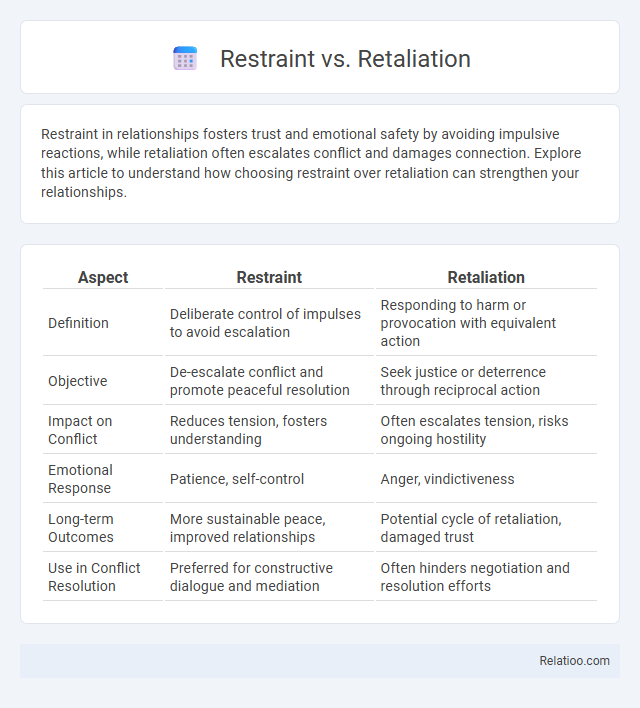Restraint in relationships fosters trust and emotional safety by avoiding impulsive reactions, while retaliation often escalates conflict and damages connection. Explore this article to understand how choosing restraint over retaliation can strengthen your relationships.
Table of Comparison
| Aspect | Restraint | Retaliation |
|---|---|---|
| Definition | Deliberate control of impulses to avoid escalation | Responding to harm or provocation with equivalent action |
| Objective | De-escalate conflict and promote peaceful resolution | Seek justice or deterrence through reciprocal action |
| Impact on Conflict | Reduces tension, fosters understanding | Often escalates tension, risks ongoing hostility |
| Emotional Response | Patience, self-control | Anger, vindictiveness |
| Long-term Outcomes | More sustainable peace, improved relationships | Potential cycle of retaliation, damaged trust |
| Use in Conflict Resolution | Preferred for constructive dialogue and mediation | Often hinders negotiation and resolution efforts |
Understanding Restraint and Retaliation
Understanding restraint involves recognizing the intentional choice to avoid escalating conflict despite provocation, prioritizing control and de-escalation. Retaliation, in contrast, refers to responding to aggression with equivalent or harsher actions, often intensifying disputes and perpetuating cycles of hostility. Your ability to discern when to exercise restraint over retaliation influences conflict resolution effectiveness and personal emotional regulation.
The Psychology Behind Restraint
The psychology behind restraint involves conscious self-control to inhibit impulsive reactions, often driven by emotional regulation and cognitive appraisal processes in the brain. Restraint helps you maintain social harmony and long-term goals by suppressing immediate retaliation impulses, which are typically triggered by perceived threats or injustices. Understanding these neural and psychological mechanisms can improve emotional intelligence and conflict resolution strategies.
The Impulse to Retaliate
The impulse to retaliate often stems from a natural emotional response to perceived harm or injustice, driving individuals toward immediate reaction rather than thoughtful restraint. Understanding this innate urge helps you recognize the importance of controlling such impulses to prevent escalation and maintain constructive communication. Practicing restraint involves managing emotional responses to foster resolution and long-term harmony instead of perpetuating conflict.
Consequences of Retaliatory Actions
Retaliation often leads to escalated conflicts, increased hostility, and prolonged disputes, impacting both personal and professional relationships negatively. Restraint, by contrast, preserves dialogue and fosters mutual understanding, reducing the risk of damaging repercussions. Choosing restraint over retaliation ultimately supports conflict resolution and maintains long-term stability.
Benefits of Practicing Restraint
Practicing restraint fosters emotional control and reduces impulsive reactions, helping you maintain composure in challenging situations. It promotes healthier relationships by preventing unnecessary retaliation and encouraging thoughtful responses. Benefits of restraint include improved decision-making, conflict resolution, and long-term personal growth.
Restraint in Conflict Resolution
Restraint in conflict resolution involves intentionally limiting aggressive actions to prevent escalation and promote dialogue, serving as a crucial mechanism for maintaining peace. Unlike retaliation, which seeks to respond to provocation with force, restraint emphasizes de-escalation through controlled responses and negotiation tactics. Effective use of restraint reduces violence, fosters mutual understanding, and creates a foundation for sustainable conflict management strategies.
When Retaliation Becomes Destructive
Retaliation becomes destructive when it escalates conflicts, causing more harm than resolution by provoking continuous cycles of aggression and emotional damage. Unlike restraint, which promotes self-control and de-escalation, destructive retaliation undermines your ability to maintain healthy relationships and peaceful outcomes. Prioritizing restraint helps you avoid the pitfalls of retaliation and fosters constructive communication and conflict management.
Building Emotional Intelligence for Restraint
Building emotional intelligence for restraint involves recognizing your emotional triggers and practicing self-control to prevent impulsive reactions. Developing empathy and mindfulness enhances your ability to pause and respond thoughtfully rather than retaliate or escalate conflicts. Strengthening restraint through emotional awareness promotes healthier relationships and effective conflict resolution.
Restraint vs Retaliation in Relationships
Restraint in relationships involves controlling impulses and responding thoughtfully to conflicts, promoting long-term trust and emotional stability. Retaliation, by contrast, often escalates disputes, eroding communication and fostering resentment between partners. Your approach to managing disagreements can determine whether the relationship thrives through understanding or deteriorates due to ongoing conflict.
Strategies to Cultivate Restraint
Strategies to cultivate restraint involve developing emotional regulation, practicing mindfulness, and enhancing self-awareness to prevent impulsive reactions. Techniques such as cognitive behavioral therapy (CBT) and stress management can strengthen one's ability to pause before responding, reducing tendencies toward retaliation. Encouraging empathy and effective communication further supports the practice of restraint in challenging situations.

Infographic: Restraint vs Retaliation
 relatioo.com
relatioo.com